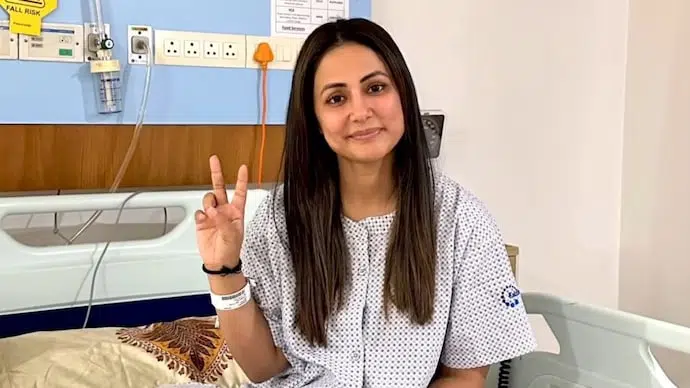Recently, the beloved TV actress Hina Khan shocked her fans by announcing her breast cancer diagnosis. Despite the initial shock, Hina is courageously confronting the disease. This news has sparked a significant conversation about the rising incidence of breast cancer, particularly among younger women.
Table of Contents

Also Read: Brain-Eating Amoeba Claims Life of 14-Year-Old Boy in Kerala
Genetic Factors: The Inherited Risk
Breast cancer was once predominantly seen in older women, but now it’s affecting younger women too. Doctors have pointed out that genetic factors are a crucial element in this increase. Approximately 10-15% of breast cancer cases are due to genetic mutations, particularly in the BRCA1 and BRCA2 genes. These mutations significantly elevate the risk of developing breast cancer. Other genes, such as TP53 and PALB-2, also play a role, although in 85% of cases, the exact cause remains unknown.
Hormonal Influences: The Role of Estrogen
Hormonal changes are another significant factor. Early menstruation, prolonged use of estrogen pills without medical supervision, and delayed first pregnancies all increase estrogen exposure. Higher estrogen levels can stimulate breast cell growth, which may lead to cancer. Thus, hormonal factors contribute notably to the rising cases of breast cancer in young women.
Lifestyle and Environmental Factors
Modern lifestyles and dietary habits have also been linked to the increasing breast cancer rates. Doctors have highlighted that a sedentary lifestyle, high consumption of processed foods, and rising obesity levels are significant contributors. Additionally, smoking and alcohol consumption are known risk factors. The adoption of a Western lifestyle, with less physical activity and unhealthy eating patterns, has exacerbated the situation.
Changes in Reproductive Patterns
Changes in reproductive and fertility patterns play a crucial role in breast cancer development. Delayed first pregnancies, choosing not to have children, and not breastfeeding can all impact estrogen levels, thereby increasing the risk of breast cancer. These factors collectively influence the hormonal balance, contributing to the disease’s prevalence.
Key Points to Watch For
Early detection is vital in combating breast cancer. Doctors advise being vigilant about the following signs:
- Lumps, swelling, or thickened areas in the breast
- Changes in the skin of the breast, such as ridges, dimpling, or color changes
- Any discharge from the nipples
- Unusual nipple appearance or inversion
While breast cancer cannot spread from person to person, having a family history of the disease can elevate the risk. Mutations in the BRCA1 and BRCA2 genes are particularly concerning. If these mutations are present in one family member, others might also carry them. This genetic predisposition, combined with a family history of breast cancer, can significantly increase an individual’s risk.
Conclusion
The rising incidence of breast cancer among young women is alarming, but understanding the contributing factors can help in early detection and prevention. Genetic predispositions, hormonal changes, lifestyle choices, and reproductive patterns all play a part. By staying informed and vigilant, individuals can better manage their risk and support ongoing efforts to combat this disease.









